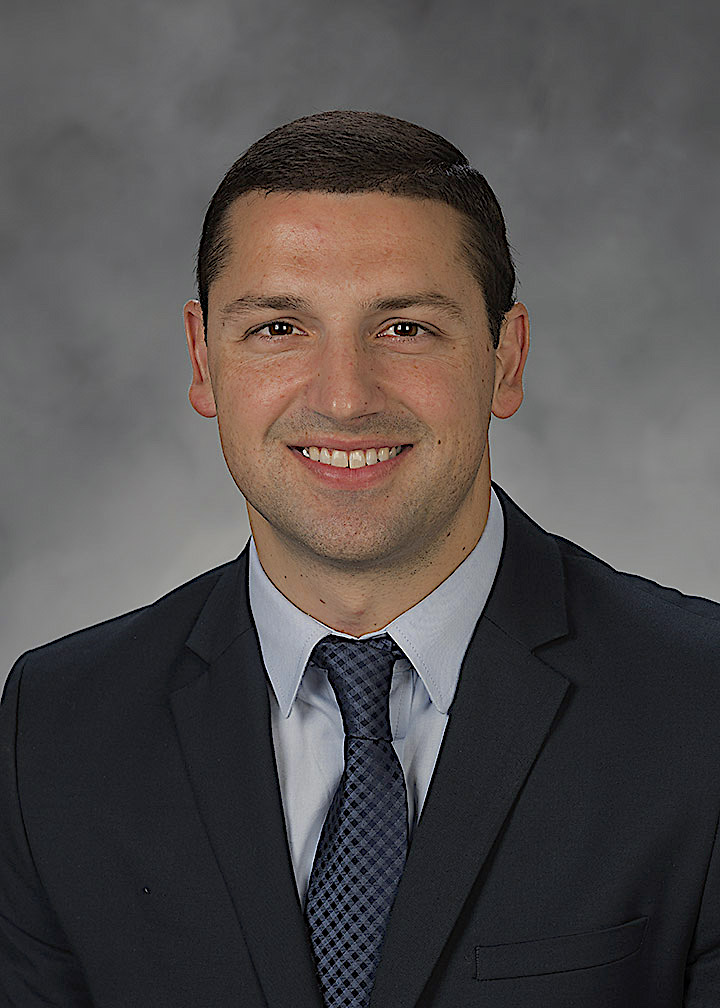
Contact Information
Name: Brian Moore, PT, DPT
Title: Assistant Professor
Office Location: FLS-1054K
Email: brian.moore@csus.edu
Office Phone: 916.278.5056
Mailing Address: 6000 J street
Biography & Research Interests
Professional Links
Dr. Moore is an Assistant Professor in the Department of Physical Therapy at CSU, Sacramento. He obtained his BS in Neuroscience and Psychology from Allegheny College in 2004 and his DPT in Physical Therapy from Emory University in 2009. He completed his Residency in Neurologic Physical Therapy at the University of Southern California/Rancho Los Amigos National Rehabilitation Center and obtained his Clinical Specialty Designation in Neurologic Physical Therapy in 2011. His areas of expertise include stroke and vestibular rehabilitation.
Dr. Moore’s research interests are based in his area of clinical practice in adult neurorehabilitation. He examines the effect of physical therapy intervention on outcomes for individuals with persistent symptoms and disability following concussion. He is also interested in investigating the reliability and validity of measurement tools used for individuals with vestibular dysfunction and how dosage and intensity influence recovery of functional walking capacity in individuals with chronic stroke.
Courses
Fall
PT 630: Pathophysiology
PT 624: Adult Neuromuscular Patient Management I
Spring
PT 614: Neuroscience for Physical Therapists
PT 644: Adult Neuromuscular Patient Management II
Publications
Moore BM, Adams JT, Wilcox S, Nicholson J. The effect of active physical training interventions on reactive postural responses in older adults: A systematic review. J Aging Phys Act. 2018;10:1-42
Moore BM. Clinical decision making to address poor outcomes in persistent horizontal semicircular canal benign paroxysmal positional vertigo: A case study. Physiotherapy Theory and Practice. 2017;May 8:1-10
Adams JT, Moore BM. Return to meaningful activities after a multi-modal rehabilitation programme among individuals who experience persistent dizziness and debility longer than 9 months after sustaining a concussion: A case series. Physiotherapy Canada. 2017:1-11
Moore BM, Adams JT, Barakatt E. Outcomes following a vestibular rehabilitation and aerobic training program to address persistent post-concussion symptoms. J Allied Health. 2016;Winter 45(4):e59-e68
Moore BM, Jou CJ, Tatalovic M, Kaufman ES, Kline DD, Kunze DL. The Kv1.1 null mouse, a model of sudden unexpected death in epilepsy (SUDEP). Epilepsia. 2014;55(11):1808-1816
Fisher BE, Lee YY, Pitsch EA, Moore B, Southam A, Faw TD, Powers CM. Method for assessing brain changes associated with gluteus maximus activation. J Orthop Sports Phys Ther. 2013;43(4):214-421
Peer-Reviewed Abstracts
The effects of an intracurricular clinical experience on students' perception of their patient management skills. McKeough DM, Moore B, Barakatt E, Mattern-Baxter K, Coleman-Salgado B. California Physical Therapy Association Annual Conference, Santa Clara, CA, 2018
Reliability and validity of a novel test to assess gaze stabilization in vestibular rehabilitation. Adams J, Moore B, Denham T, Kedzierska I. International Vestibular Rehabilitation Conference, Chicago, IL, 2018
Interprofessional Education for Concussion/mTBI Assessment. D’Angelo L, Moore B, Mikal-Flynn J. Brain Injury Summit, Vail, CO, 2018
Investigation of the observer effect on the measurement of walking speed in individuals with vestibular dysfunction. Moore B. WCPT Congress 2017, Cape Town
Investigation of the observer effect on the measurement of walking speed in individuals with vestibular dysfunction. Moore B. American Physical Therapy Association Combined Sections Meeting, San Antonio, TX, 2016
Vestibular rehabilitation following concussion: an exploratory study. Moore B, Adams JT. American Physical Therapy Association Combined Sections Meeting, Indianapolis, IN, 2015
Clinical decision making to address poor outcomes in persistent horizontal semicircular canal benign paroxysmal positional vertigo: a case study. Moore B. APTA Combined Sections Meeting, Indianapolis, IN, 2015
Reliability of corticospinal excitability of gluteus maximus muscles using transcranial magnetic stimulation. Lee YY, Moore B, Faw T, Pitsch E, Pong J, Powers C, Fisher B. Society for Neuroscience, San Diego, CA, 2010
Differential diagnosis in vestibular rehabilitation using the vestibular diagnostic matrix. Hoder J, DeWitt R, Moore B, Sager J, Goodrich J, Herman SJ. APTA Combined Sections Meeting, San Diego, 2010
Honors and Awards
Research and Creative Activity Faculty Award for, “Investigating the limits of improvement in walking recovery in chronic stroke: Is there evidence of a plateau?,” California State University, Sacramento, 2018
Clinical Validation Research Study Award for, “Investigating the limits of improvement in walking recovery in chronic stroke: Is there evidence of a plateau?,” California Physical Therapy Fund, Inc., 2017
Summer Research Fellowship Grant Program for, “Change in student clinical self-efficacy following participation in pro bono clinic as laboratory experience in adult neuromuscular patient management course,” Health & Human Services, California State University, Sacramento, 2017
Research and Creative Activity Faculty Award for, “Investigation of the observer effect on the measurement of walking speed in individuals with vestibular dysfunction,” California State University, Sacramento, 2015